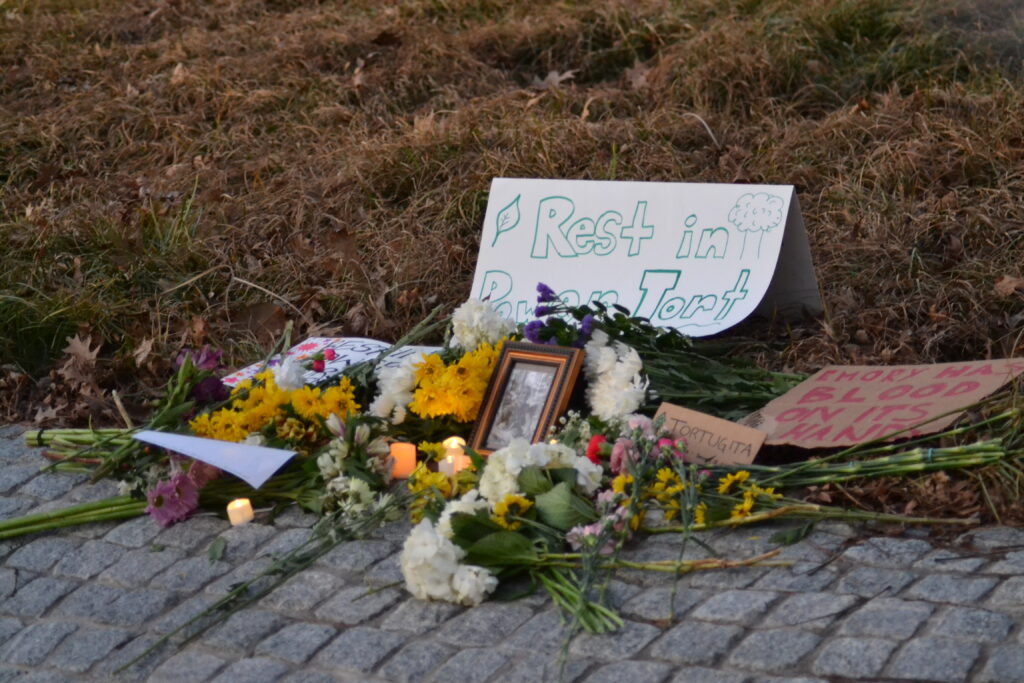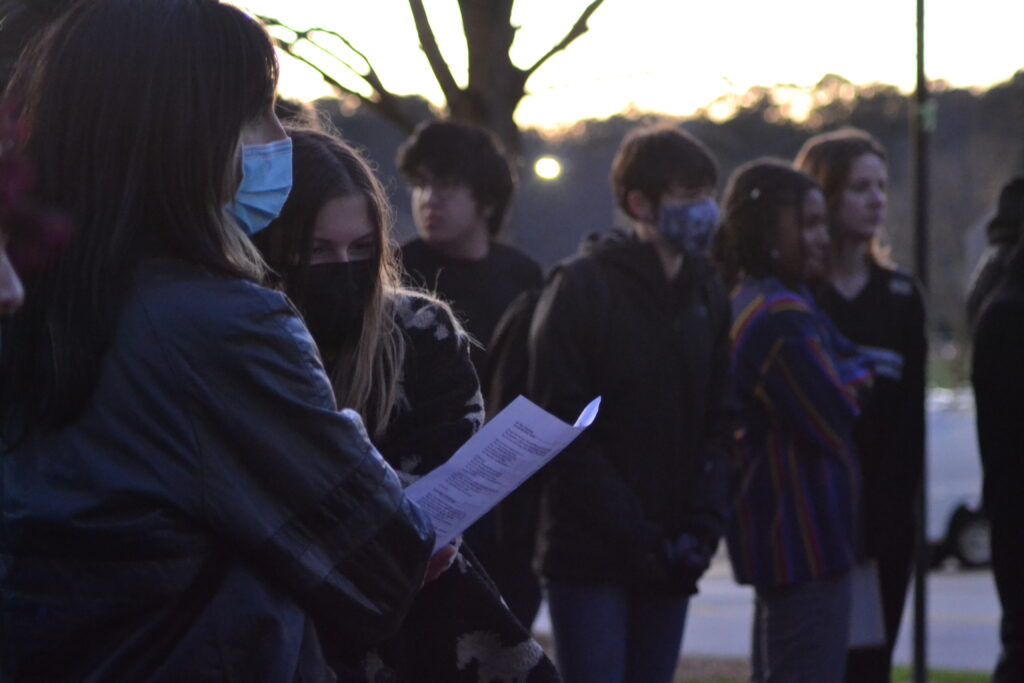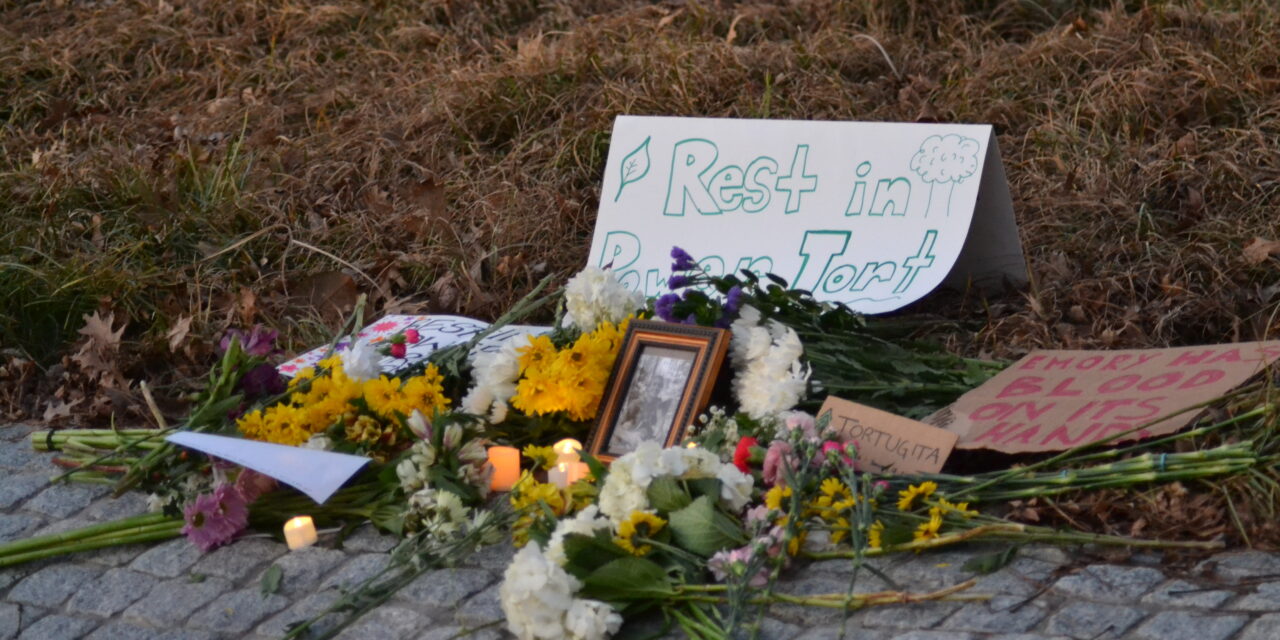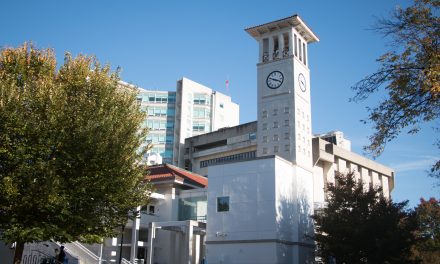As the sun set on Jan 23., a group huddled close together on Asbury circle. Some held bunches of flowers in their arms, kneeling to place them around candles and pictures. Soft guitar lingered in the air.
Emory University students hosted a vigil on Asbury Circle to honor the life of Indigenous environmental activist Manuel Terán, known as Tortuguita, who was shot and killed on Jan. 18 in an altercation with the Atlanta Police Department and Georgia Bureau of Investigation in the forest. They were 26 years old.
Dozens of students, alumni and community members attended the vigil, and many were dressed in black for mourning.
This was the first time in United States history that an activist was killed in an attempt to protest the forest being developed.
Terán was one of the environmental activists living in the South River Forest, also called the Weelaunee Forest to protest the Atlanta Police Foundation’s $90 million proposed Atlanta Public Safety Training Center, coined “Cop City” by activists. This follows the Atlanta City Council proposing the construction of the police training facility in June 2021. Building the Atlanta Public Safety Training Center would require 85 acres of Weelaunee Forest land to be cut down, and in total, City Council leased 381 acres of land to the Atlanta Police Foundation.
The facility aims to “improve morale, retention, recruitment and training” for the Atlanta Police Department and the Atlanta Fire Rescue Department in a state which would have the fourth highest incarceration rate in the world if every U.S. state were a country.
The encampment includes common spaces and kitchens, and the community often holds teaching sessions on the history of the land, guided walks, dinners, book talks and music shows.
When the Atlanta City Council opened for solicited public comment on the facility in September 2021, they received 17 hours of comments. Of the comments, 70% opposed the Cop City facility on environmental and racial justice grounds. However, Atlanta approved plans later that month.

Photos, signs and flowers lay on Asbury circle in honor Manuel “Tortuguita” Terán. (Soph Guerieri/Contributing Photographer)
Officers have been deployed to the site multiple times to start construction, but have been unable to begin development due to protesters on the site. In mid-January 2022, environmental activists living in the forest escorted several workers who had entered the forest with bulldozers to conduct soil boring and geotechnical engineering tests but lacked the paperwork legally required to do so.
Since December 2022, there have been two police raids attempting to remove protesters from the forest.
On Dec. 13, 2022, The Atlanta Police Department and Georgia Bureau of Investigation arrested five environmental activists, who call themselves “forest defenders,” on domestic terrorism charges. The agencies reportedly found gasoline, explosive devices and road flares. While the forest is public land, it is considered trespassing if protesters fail to leave after being ordered to do so. The same day, law enforcement sprayed the forest defenders who were living in the forest with tear gas and forced them off Weelaunee Forest.
Police attempts to remove the protesters — which escalated to the use of chemical weapons — have resulted in the destruction of the forest’s bike and walking paths, community gardens and installations.
Then, on Jan. 18, police killed a forest defender.
The death of Manuel ‘Tortuguita’ Terán
At the time of the Jan. 18 raid, Terán was living in the Weelaunee Forest to protest Cop City, which would be one of the largest police training facilities in the United States. At 85 acres, the complex will include shooting ranges, virtual reality shooting simulations, a burn building, neighborhoods and a mock city. Los Angeles and New York City — cities with two of the top three largest police departments in the country — use a 32-acre facility and 21-acre facility, respectively. Meanwhile, the Atlanta Police Department ranks No. 19 in size.
The moments leading up to Terán’s death have been called into question by activists. The Georgia Bureau of Investigation wrote in a Jan. 18 statement that Terán fired first, hitting a Georgia State Patrol trooper before other officers returned fire. Five days later, the Bureau confirmed that Terán legally purchased the firearm they used to shoot the trooper in 2020.
However, a lack of bodycam footage and contradicting witness accounts led to calls for further investigation. The Bureau responded in a Jan. 23 statement, saying that although the officers near the shooting were not wearing bodycams, footage of the aftermath was captured but has not been released.
In an article about the incident, journalist David Peisner — who spent six months in the forest getting to know Terán — said that although it is possible law enforcement is being truthful, officials have given “erroneous” narratives in the past after killings by police, citing George Floyd as an example.
“We’re not going to beat them at violence,” Terán said in an interview with Peisner. “They’re very, very good at violence. We’re not. We win through nonviolence.”
The Atlanta Solidarity Fund is currently preparing a legal team to pursue “a wrongful death suit.” Missouri Rep. Cori Bush (D-1) tweeted on Jan. 24 that she was “calling for an independent investigation” into Terán’s death, and Michigan Rep. Rashida Tlaib (D-12) tweeted her support on Jan 25.
Emory students show solidarity, hold vigil
Terán’s death sparked numerous vigils and protests across the country.
On Jan. 23, Emory University students hosted a vigil on Asbury Circle to honor Terán’s life. Dozens of students, alumni and community members attended the vigil, and many were dressed in black for mourning. Attendees brought candles, signs, flowers and pictures of Terán.
Gabriel Eisen (18Ox, 20C), a friend of Terán, gave a speech at Emory’s vigil. He discussed University administration’s ties to the construction of Cop City, mentioning both University President Gregory Fenves and former University President Claire Sterk, who currently serves as a Charles Howard Candler professor of public health.
Fenves is a member of the Atlanta Committee for Progress, which is made up of more than 40 Atlanta-based corporate-elite chief executive officers and has expressed support for Cop City’s development. In 2021, the Atlanta Committee for Progress released a statement noting that former Atlanta Mayor Keisha Lance Bottoms asked the committee to “lead a capital campaign to seed the initial private funding for the project,” which they accepted.
Sterk, among representatives from major corporations like Waffle House and Delta Airlines, sits on the Atlanta Police Foundation Board of Trustees, a public-private partnership with the Atlanta Police Department. On Sept. 8, 2021, the Atlanta City Council released a statement saying the Atlanta Police Foundation “intends to fund and build” the facility.
In total, 80% of funding for Cop City comes from private donations.
Eisen said Emory’s connections to Cop City makes the University “complicit in Terán’s death.”
“The main thing Emory should do as an institution is condemn Cop City,” Eisen said. “Emory has so much power in Atlanta. If they were really standing up to what they believed, and for what the students believe, they would formally withdraw support, and put out some kind of statement.”
In an email to the Wheel, Assistant Vice President for University Communications and Marketing Laura Diamond wrote that while the University does not have any institutional ties with the Atlanta Police Foundation, community safety is a “top priority” and Emory works with and supports law enforcement on a variety of issues, including public safety.
“We encourage our community to engage peacefully and we reject and condemn violence in all its forms,” Diamond wrote. “Emory is a place where we discuss and debate the issues that divide us — this is a foundational aspect of our mission to educate. We will continue to support the rights of our students, faculty and staff to share their opinions on this issue and others while reminding our community that individuals are speaking for themselves and not on behalf of the University.”
Lucy Amirani (24C), who attended the vigil, said she got involved with the Stop Cop City movement a year ago through the Sunrise Movement in Atlanta, a community organization that works to fight climate change. She recently joined Emory organizers supporting the movement on campus after hearing of Terán’s death.
“All the speakers were really powerful, especially the ones who actually knew [Terán] and were able to bring their spirit into the event, because a lot of us never actually met them, even those of us who had been to the forest,” Amirani said.

Emory students hosted a vigil on Asbury Circle to honor the life of Indigenous environmental activist Manuel “Tortuguita” Terán. (Soph Guerieri/Contributing Photographer)
Community reaction
In an August 2021 open letter to the Atlanta City Council, environmental organizations raised concerns about adverse environmental impacts of the project, such as the destruction of a major green space needed to prevent flooding and provide shade and clean air.
The project would also expose surrounding areas to noise pollution and heavy metals used in bullets. Cop City is surrounded by predominantly Black and working class neighborhoods, which have asthma rates in the 94th percentile and diabetes in the 80th percentile nationally.
Defend the Atlanta Forest, an autonomous social movement, also raised concerns about the “scarred” history of the land, pointing to the displacement of the Muscogee Creek people in the 1800s, and later, the use of land as the Atlanta Prison Farm, a facility that infamously exploited prisoners for unpaid labor, from the 1950s to 1990s.
A few hundred demonstrators gathered at Underground Atlanta on Jan. 21 to protest Terán’s death. Protesters held signs with slogans such as “free the activists, drop the charges” and “body cams for all cops.”
One speaker identified themself as Terán’s friend, stating that the protest also stood for demanding racial justice. Other speakers commented on capitalism’s relationship to climate change. The demonstrators then marched down Peachtree Street after the speeches, chanting, “We are all forest defenders. No justice, no peace, no racist-ass police.”
Around 6 p.m., the demonstration escalated when a group of protesters vandalized businesses that support Cop City, including Wells Fargo & Company and the Atlanta Police Foundation headquarters. This resulted in the Atlanta Police Department arresting six protesters. Witnesses alleged that the police “violently slammed several individuals to the ground” and hit a protester with a car, according to a Jan. 22 press release by the Atlanta Press Collective and an NBC News article.
Additionally, Defend the Atlanta Forest tweeted a video of an Atlanta police officer kneeling on a protester’s neck as they yelled “I can’t breathe.”
Alison Thieberg (25C) attended the protest with her friends.
“When it was just people talking, sharing speeches, that’s when it kind of felt like it was at its best,” Thieberg said. “Even when we were walking in some of the less crowded streets and cars were honking at us in support, it also felt really good.”
Thieberg added that, although she was glad to see some Emory students and faculty, she expected more to attend.
“We live in an area full of protected forests and we benefit a lot from them,” Thieberg said. “We can go on and talk about how it’s important to support it, but I wish we saw more people physically going out and demonstrating that.”
In addition to protests, the Atlanta community held vigils in remembrance of Terán, one of which was held on Jan. 18 in Little Five Points. About 300 people gathered with candles, flowers and signs to sing in remembrance of Terán and give speeches about the violence.
Laura Kearns (01PH) attended a second vigil, which was held on Jan. 20 in the Weelaunee Forest parking lot.
“I felt it was very important to show up and to be there in that place with people who knew [them] and who have the same shared understanding and values of the forest and serving nature,” Kearns said.
Kearns also brought attention to the impact of Emory on the local community.“It’s important for everyone to think about the future and what legacy we’re leaving to the next generation,” Kearns added. “Emory as a university and a place of learning has a particular important role. What are the values it should be promoting? Getting off the [Atlanta Police Foundation Board of Trustees] would be the first step.”





